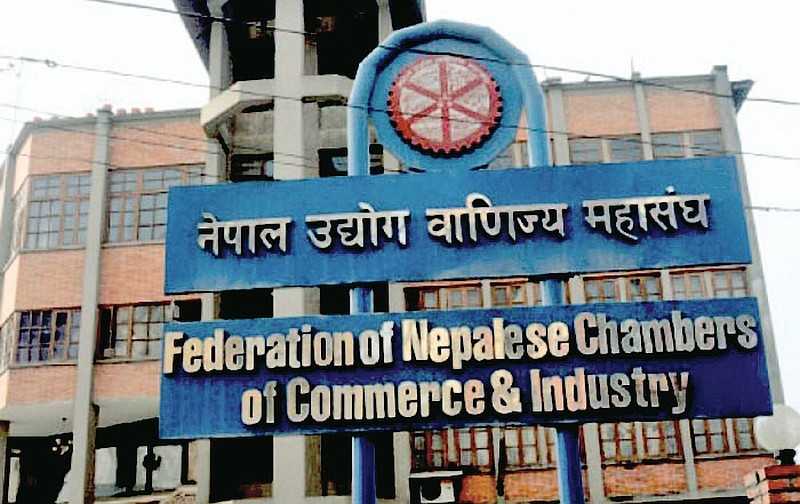Kathmandu: The Federation of Nepalese Chambers of Commerce and Industry (FNCCI) has expressed optimism that the monetary policy for fiscal year 2025/26, recently unveiled by Nepal Rastra Bank (NRB), will help stimulate economic growth.
The policy, announced by NRB Governor Dr. Vishwanath Paudel on 10 July, emphasizes the need to boost targeted investments while strengthening risk management in the financial sector.
The FNCCI particularly welcomed the decision to maintain the stable exchange rate between the Nepali rupee and Indian rupee, which serves as a crucial safeguard for Nepal’s international trade.
Key changes in the monetary policy include reductions in several benchmark rates. The bank rate, serving as the upper limit of the interest rate corridor, has been lowered from 6.5 percent to 6 percent, while the deposit collection rate at the lower end has been cut from 3 percent to 2.75 percent. The policy rate has also been reduced from 5 percent to 4.5 percent.
These adjustments are expected to decrease borrowing costs and potentially increase credit flow. However, the FNCCI cautioned that the lower returns on savings might discourage depositors, potentially affecting bank liquidity.
In a move to stimulate the real estate sector, the policy has increased the loan limit for private residential home construction and purchase from Rs 20 million to Rs 30 million. First-time homebuyers can now access loans covering up to 80 percent of the property value, while others qualify for up to 70 percent financing. The FNCCI believes these measures will make homeownership more accessible and have positive ripple effects across the economy.
The monetary policy introduces more flexible working capital loan guidelines tailored to different sectors including agriculture, small industries, education, and healthcare. These modifications consider each industry’s unique cash flow cycles.
While welcoming these changes, the FNCCI suggested that banks and borrowers should have greater autonomy in negotiating loan terms based on individual circumstances.
Several measures aim to ease credit access for small businesses and farmers. Financial institutions can now self-assess collateral values when approving loans up to Rs 1 million for agricultural or business purposes. The policy also reduces provisioning requirements during grace periods for such loans and offers special terms for high-yield crops identified by the Nepal Agricultural Research Council.
Recognizing the importance of tourism, the policy provides special support to certified hotels and restaurants located near major transportation routes. Businesses in this sector can access loans up to Rs 30 million under favourable terms, with interest rates capped at 2 percent above the base rate.
The policy includes several debt relief measures, particularly for earthquake-affected regions like Jajarkot and Rukum, where borrowers can receive 10 percent interest waivers on commercial loans. The FNCCI has urged authorities to extend similar relief to all struggling borrowers nationwide. Registered real estate firms will also benefit from easier loan restructuring options.
To boost the stock market, the margin lending limit for share purchases has been increased from Rs 150 million to Rs 250 million per borrower. The policy also relaxes cheque bounce penalties while calling for stronger debt recovery legislation.
The monetary policy encourages infrastructure investment by allowing banks to purchase bonds issued by government-approved projects. It also promises amendments to foreign investment regulations to simplify capital repatriation processes. With foreign direct investment currently at just 0.2 percent of GDP, the FNCCI stressed the urgency of implementing these reforms.
Several customer-friendly measures have been introduced, including an increase in foreign exchange allowances for international travelers from US$ 2,500 to US$ 3,000. The policy also simplifies Know Your Customers (KYC) procedures by accepting national ID cards and promotes digital lending platforms to serve small businesses better.
NRB has set ambitious targets of 13 percent growth in broad money supply and 12 percent expansion in private sector credit for the coming year. However, with current credit growth below 8 percent, the FNCCI emphasized that effective policy implementation will be crucial to achieving these goals and revitalizing Nepal’s economy.
The FNCCI concluded by urging authorities to extend debt relief measures more broadly, strengthen financial regulations, and accelerate reforms to create a more favourable business environment. While optimistic about the policy’s potential, the business body stressed that its success will ultimately depend on proper execution and continued dialogue between regulators and the private sector.



Comment Here